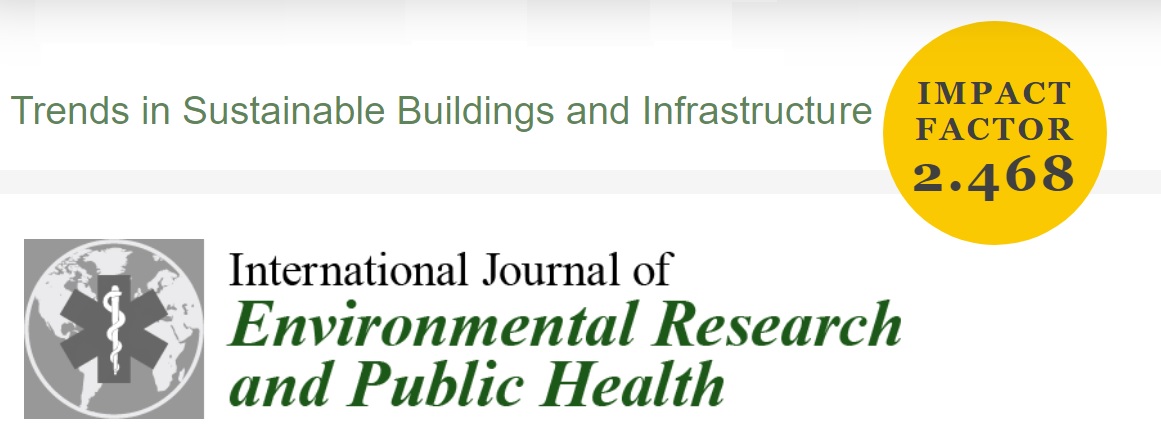High visibility: indexed by the Science Citation Index Expanded, the Social Sciences Citation Index (Web of Science) and other databases. Impact Factor: 3.390 (2020)
JCR category rank: Q1: Public, Environmental & Occupational Health (SSCI) | Q2: Public, Environmental & Occupational Health (SCIE) | Q2: Environmental Sciences (SCIE)
Special Issue “2nd Edition of Trends in Sustainable Buildings and Infrastructure”
A special issue of International Journal of Environmental Research and Public Health (ISSN 1660-4601).
Deadline for manuscript submissions: 30 September 2022.
Special Issue Editors
|
Guest Editor Prof. Dr. Víctor Yepes
Concrete Science and Technology Institute (ICITECH), Department of Construction Engineering and Civil Engineering Projects, Universitat Politècnica de València Valencia, Spain
Interests: multiobjective optimization; structures optimization; lifecycle assessment; social sustainability of infrastructures; reliability-based maintenance optimization; optimization and decision-making under uncertainty |
|
|
Guest Editor Prof. Dr. Moacir Kripka
Civil and Environmental Engineering Graduate Program (PPGEng), University of Passo Fundo, Passo Fundo CEP 99052-900, Brazil
Interests: structural analysis; optimization; building; engineering optimization; civil engineering; linear programming; mathematical programming; heuristics; structural optimization; concrete; combinatorial optimization; structural engineering; multiobjective optimization; reinforced concrete; optimization methods; discrete optimization; optimization theory; simulated annealing; optimization software |
Special Issue Information
Dear Colleagues,
This Special Issue is the 2nd edition of Trends in Sustainable Buildings and Infrastructure. The recently established Sustainable Development Goals call for a paradigm shift in the way buildings and infrastructures are conceived. The construction industry is a main source of environmental impacts, given its great material consumption and energy demands. It is also a major contributor to the economic growth of regions through the provision of useful infrastructure and generation of employment, among others. Conventional approaches underlying current building design practices fall short of covering the relevant environmental and social implications derived from inappropriate design, construction, and planning. The development of adequate sustainable design strategies is therefore becoming extremely relevant with regard to the achievement of the United Nations 2030 Agenda Goals for Sustainable Development.
This Special Issue aims to increase knowledge on sustainable design practices by highlighting the actual research trends that explore efficient ways to reduce the environmental consequences related to the construction industry while promoting social wellbeing and economic development. These objectives include but are not limited to:
- Life-cycle-oriented building and infrastructure design;
- Design optimization based on sustainable criteria;
- Maintenance design towards sustainability;
- Inclusion of social impacts in the design of buildings and infrastructures;
- Resilience and sustainability;
- Use of sustainable materials;
- Decision-making processes that effectively integrate economic, environmental, and social aspects.
Papers selected for this Special Issue will be subject to a rigorous peer-review procedure with the aim of rapid and wide dissemination of research results, developments, and applications.
Submission
Manuscripts should be submitted online at www.mdpi.com by registering and logging in to this website. Once you are registered, click here to go to the submission form. Manuscripts can be submitted until the deadline. All papers will be peer-reviewed. Accepted papers will be published continuously in the journal (as soon as accepted) and will be listed together on the special issue website. Research articles, review articles as well as short communications are invited. For planned papers, a title and short abstract (about 100 words) can be sent to the Editorial Office for announcement on this website.
Submitted manuscripts should not have been published previously, nor be under consideration for publication elsewhere (except conference proceedings papers). All manuscripts are thoroughly refereed through a single-blind peer-review process. A guide for authors and other relevant information for submission of manuscripts is available on the Instructions for Authors page. International Journal of Environmental Research and Public Health is an international peer-reviewed open access semimonthly journal published by MDPI.
Keywords
- Sustainable design and construction
- Life cycle assessment
- Sustainability in decision making
- Green buildings
- Sustainable maintenance
- Resilient structures
- Sustainable materials
- Social life cycle assessment
- Sustainable management of infrastructures
- Multiobjective optimization for sustainable development


